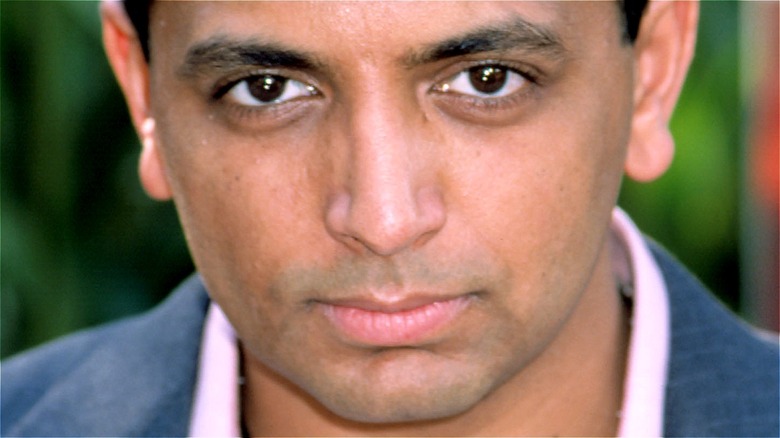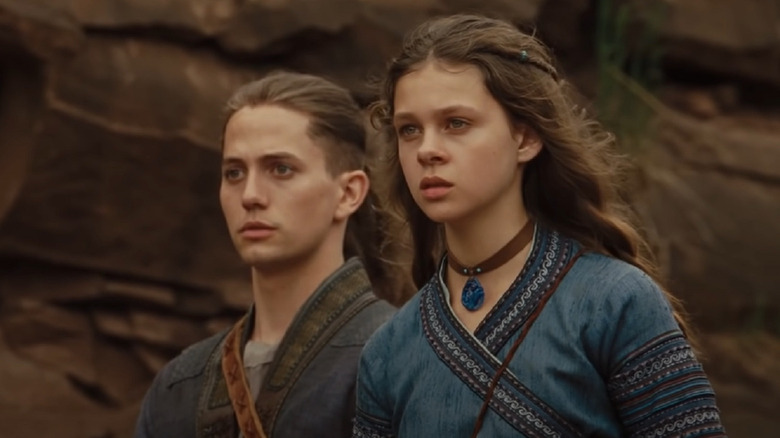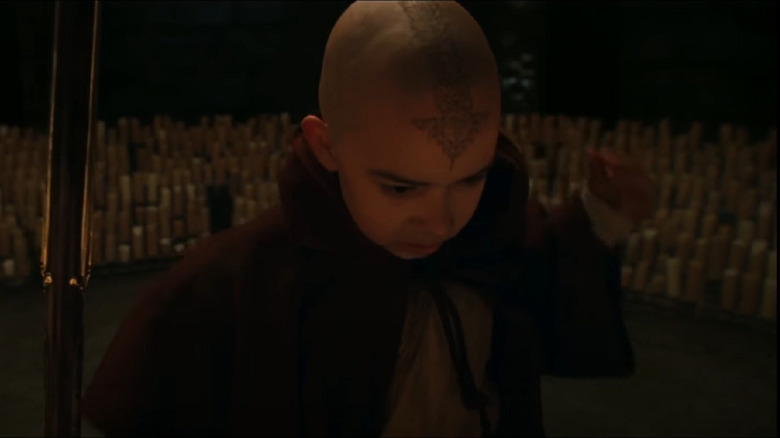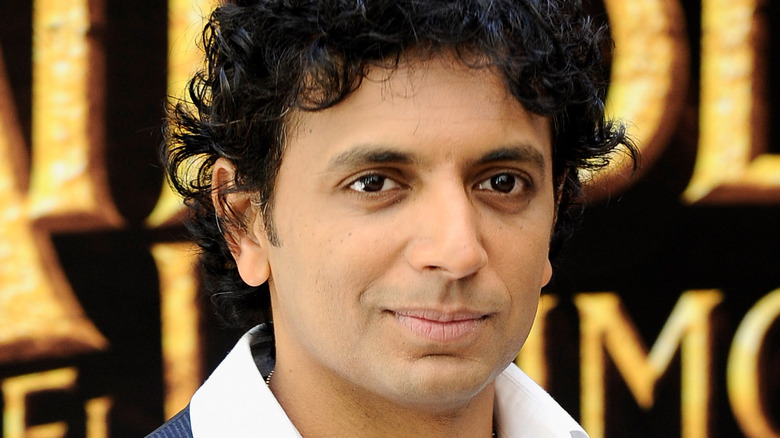The Last Airbender Controversy That Doomed The Movie Before It Opened
Adapting a beloved original work to the big screen has its risks. For one, you're not doing something from scratch which people will appreciate for what it is, with no prior preconceptions or specific expectations. In the particular case of "The Last Airbender" (2010) director M. Night Shyamalan took a daring risk in endeavoring to bring into existence a live-action silver screen adaptation of the well-loved Nickelodeon animation series, a hallmark of the genre in the childhood of many. However, Shyamalan's feature would never see a sequel.
In a way, it might have seemed like a relatively safe choice as there already was a widely established fan base that would certainly not be missing the chance of seeing a live-action adaptation of the stellar animated series on the big screen. However, this backfired sensationally, and Shyamalan's is now known as a spectacular flop, or in the words of Roger Ebert, "An agonizing experience in every category I can think of and others still waiting to be invented."
But some may say the film already had the potential to fail even before its theatrical premiere, and critics had been quite vocal in detailing exactly why the film would crash, well before its official take-off.
The fall began with the casting
For many, the film's problems began as early as the casting phase. Indeed, one of the main accusations thrown at Shyamalan's flick is that it whitewashed its cast by casting white actors in the heroes' roles. The characters in question are supposed to be Eastern Asian (Aang) and Native American or perhaps Central Asian (the siblings Katara and Sokka) and instead they were represented by actors who do not belong to those ethnic groups.
Some critics have deemed the casting choices as having adverse effects on children who do not see themselves represented. As Reappropriate's Jenn Fang wrote (per The Atlantic), "These film executives are sending the message: 'Asians simply aren't familiar enough — not 'American' enough – for White movie audiences to relate to'."
In trying to appeal to a specific audience, films with whitewashed casts forget all the other different kinds of moviegoers who deserve to recognize themselves when they go to the cinema. In the 21st century, it has become clear that movies should be inclusive enough so that everyone, no matter their origin or physical attributes, feels that they, too, can be the heroes if they so wish it. This was a quality that many found lacking in "The Last Airbender."
The barrage of criticism
The criticism of "The Last Airbender" encompassed most of the film's components, including but not limited to the script and the special effects. However, critics were especially incisive when it came to the casting and the slamming of the choice came from all directions.
As Ebert wrote, "After the miscalculation of making the movie as live-action, there remained the challenge of casting it. Shyamalan has failed. His first inexplicable mistake was to change the races of the leading characters ... This casting makes no sense because (1) It's a distraction for fans of the hugely popular TV series, and (2) all three actors are pretty bad. I don't say they're untalented, I say they've been poorly served by Shyamalan and the script. They are bland, stiff, awkward and unconvincing."
Unfortunately, in failing to appropriately cast the main three characters, "The Last Airbender" never had a chance to be a box office success. The audience for Shyamalan's flick was mainly kids and teens who grew up to fall in love with the Nickelodeon animation series and one should be extra careful when dealing with such a beloved and esteemed product. In this way, "The Last Airbender" negatively defied expectations and caused outrage.
As said by Michael Le, a member of Racebending (a group that boycotted "The Last Airbender"), "It's unfortunate that it's come to this ... They've constructed a film that is contrary not only to what fans expected to see but is also contrary to what America expects to see in a film released in 2010 featuring Asian culture and Asian and Native American characters as heroes" (per The Atlantic).
Shyamalan's defense
In coming under fire, Shyamalan did not stay quiet, instead, he expressed his confoundedness for having been the target of such negative remarks, especially taking into consideration that he himself is not white (via The Atlantic).
"You're coming at me, the one Asian filmmaker who has the right to cast anybody I want, and I'm casting this entire movie in this color blind way where everyone is represented. I even had one section of the Earth kingdom as African American, which obviously isn't in the show, but I wanted to represent them, too!"
This planned section, though, never came to be — as the movie ended at the end of the Book of Water and before the Book of Earth. Shyamalan expected to make a sequel, possibly a trilogy, but that would never come to pass. As Shyamalan continued to elaborate on his frustration, he said, "It's infuriating, this stigmatization, that the first word about the most culturally-diverse movie of all time is this accusation. And here's the irony of it, this has nothing to do with the studio system. I had complete say in casting. So, if you need to point the racist finger, point it at me, and if it doesn't stick, then be quiet."
So, did it stick? The answer to this might differ from person to person. But some critics have defended Shyamalan by saying that although he made an obvious mistake, this misjudgment did not originate from a place of malice or bigotry. Indeed, sometimes it's more reasonable to not add hatred to the criticism as it stifles the opportunity for learning and growth. What fans can now hope, over a decade after the release of "The Last Airbender," is that other filmmakers — and Shyamalan himself — have learned from his mistake.



